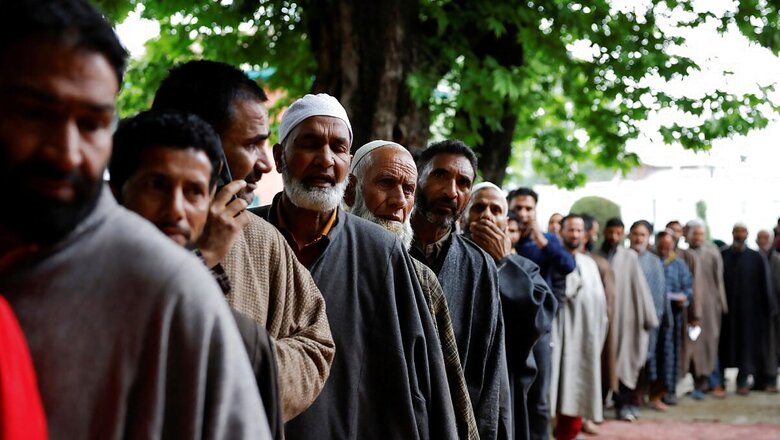
views
The creation of the union territory of Jammu and Kashmir was announced in August 2019 and officially came into existence in October 2019. The last time the erstwhile state witnessed assembly polls was in November-December 2014. The seats in the J&K assembly have been vacant since 2018. Finally, on Friday, the Election Commission of India (ECI) announced dates for polls in the UT.
J&K will see polling in three phases, starting from September 18, covering 24 constituencies. The second phase, for 26 seats, will be held on September 25, and the third, covering 40 seats, on October 1. The counting of votes will be done on October 4. The elections will be completed before October 6.
But why exactly were the elections not held all these years? Here’s a timeline of what happened in the erstwhile state that converted into a UT in 2019.
2014 assembly elections
The former state saw elections in 2014. It was a split verdict. The magic figure of 44 was not crossed by any party. When the elections were announced, Omar Abdullah was the chief minister. He resigned from the post on December 24, 2014, but continued to be the caretaker CM until January 2015.
The then-ruling party, National Conference, won 15 seats and the Peoples Democratic Party emerged as the single largest party with 28 seats. The BJP got 25 seats and Congress just 12 in the House of 87 members.
Eventually, Governor’s Rule was imposed that continued for 49 days until PDP leader late Mufti Mohammad Sayeed took charge with the help of the Bharatiya Janata Party. He assumed office on March 1, 2015, but died on January 7, 2016.
The state again went under Governor’s Rule between January 8 and April 4 in 2016 until his daughter Mehbooba Mufti became the chief minister with the help of the BJP. In 2018, the BJP pulled out of the ruling alliance, resulting in the first female CM of the state having to quit in June 2018.
Once again, J&K saw Governor’s Rule and in November 2018 the assembly was dissolved.
Then President’s Rule was imposed from December 2019 for six months. As per the Constitution, President’s Rule has to be renewed every six months by Parliament, and it can be revoked by the President at any time. In July 2019, President’s Rule in Jammu and Kashmir was extended for another six months.
In August 2019, the Centre brought the Jammu and Kashmir Reorganisation Bill to restructure the state into two separate union territories, Jammu and Kashmir, and Ladakh, where J&K would have an assembly and Ladakh would not.
Post-2019
The Jammu and Kashmir Reorganisation Act was implemented in 2019. Before that, there were 107 assembly seats in the state, including 24 in Pakistan-occupied Kashmir (PoK).
Delimitation was done in 2022. Earlier, Chief Election Commissioner Rajiv Kumar had said that “there was no point in holding elections before that”.
When delimitation was done in 2022, the number of seats in the assembly increased to 114, including 24 in PoK.
Earlier there were 37 seats in Jammu which increased to 43 in delimitation, 46 seats in Kashmir increased to 47, and 24 seats have been kept reserved for Pakistan-occupied Kashmir. The number of nominated members in the assembly increased from two to five.
Now, there was dissonance between the Reorganisation Act and delimitation, which had to be resolved first before the poll body could hold elections
It was in December 2023 that the Jammu and Kashmir Reorganisation (Amendment) Bill came that accepted the delimitation numbers.
What changed after 2024 Lok Sabha polls
The amendment in the bill set the stage for the Election Commission of India (ECI) to hold polls in Jammu and Kashmir. The same month, the Supreme Court also ordered the ECI to hold elections in Jammu and Kashmir by September 30, 2024.
There were talks that the ECI may hold simultaneous polls in J&K for Lok Sabha and assembly between April and June but that also did not happen.
In March, after visiting the UT for Lok Sabha preparations, Kumar had said that the ECI was aware of its responsibility and that “there should not be any political vacuum”.
He had raised the issue of security arrangements, saying that, unlike the rest of the country, all the candidates in J&K have to be given protective cover. So the deployment has to be enough.
Kumar, while announcing the dates on Friday, said that political parties asked the poll body to ensure due security to candidates and he assured them of that.
When the Lok Sabha polls were held in the UT recently, the voter turnout was far above expectations. The five Lok Sabha seats in Jammu and Kashmir recorded a 58 per cent average voter turnout, the second-best performance in history, after 66 per cent recorded in 1984.
Soon after the elections were completed peacefully in the UT, Kumar had said that now was the right time to hold assembly polls in the erstwhile state. Wasting no time, the ECI also started preparations. In June, it began accepting applications from political parties for the use of common symbols for their candidates – one of the first steps for elections in the UT. Soon after, the process of updating electoral rolls was also started.
However, another major hurdle before the ECI was the annual Amarnath Yatra in the union territory that was scheduled between June 29 and August 19. Due to security reasons, elections could not take place during this period.
Announcing the dates on Friday, Kumar said the yatra is ending on August 19 and the final electoral roll will be published on August 20, paving the way for holding the polls.
Last week, the CEC and his team completed a two-day visit to Jammu and Kashmir to review assembly poll preparedness, assuring that they have the Supreme Court-directed deadline in mind and are ready to hold elections soon.


















Comments
0 comment